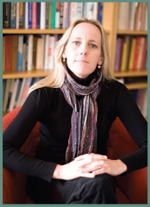Editor’s Note
 AWARDS CEREMONIES are fun, right? People who receive awards from an august body at some sort of gala, such as the American Humanist Association’s Humanist of the Year banquet, are usually very bright and interesting, and you never really know what they’re going to say. Kurt Vonnegut famously dissected why his dog wasn’t a humanist and had the audience rolling in the aisles when he quipped that his dearly deceased comrade Isaac Asimov was “in heaven now.” PZ Myers tore a page from a Gideon Bible he’d taken from his hotel room to point out just how thin the story creationists hold up against the whole edifice of evolutionary science really is, and Ted Turner shared his amazement that he was still alive after the things he’d said about abortion and overpopulation (“who knows, when you pick up a paper tomorrow, I may not be,” he joked). He also cut an audience member off when addressed as Mr. Turner: “Call me Ted. After all, there’s so few of us we ought to be on a first-name basis.”
AWARDS CEREMONIES are fun, right? People who receive awards from an august body at some sort of gala, such as the American Humanist Association’s Humanist of the Year banquet, are usually very bright and interesting, and you never really know what they’re going to say. Kurt Vonnegut famously dissected why his dog wasn’t a humanist and had the audience rolling in the aisles when he quipped that his dearly deceased comrade Isaac Asimov was “in heaven now.” PZ Myers tore a page from a Gideon Bible he’d taken from his hotel room to point out just how thin the story creationists hold up against the whole edifice of evolutionary science really is, and Ted Turner shared his amazement that he was still alive after the things he’d said about abortion and overpopulation (“who knows, when you pick up a paper tomorrow, I may not be,” he joked). He also cut an audience member off when addressed as Mr. Turner: “Call me Ted. After all, there’s so few of us we ought to be on a first-name basis.”
All kidding aside, when it comes to the exemplary humanists honored annually by the AHA we can always count on the caliber of their intellect and integrity, and look forward to their keen and unique articulation of humanist principles. And the award acceptance speeches that succeed most not only enlighten us, but create a sense of unity such that these famous folks are at once beyond and one of us.
2011 Humanist of the Year Rebecca Goldstein certainly succeeds, going deep and lyrical in her acceptance speech given at the AHA’s annual conference in Boston this past April and adapted herein. Invoking Oscar Wilde’s “Confraternity of the Fatherless” and the transcendent secular vision of her greatest intellectual hero, Baruch Spinoza, the novelist and philosopher deftly moves among the pantheon of secularists and her own rebellious ideas to create a genuine unanimity with those in the room and now with you, the reader. Tune in, lovers of highbrow rebels and hardcore rational epistemology—you’re in for a treat.
Joining Goldstein in this year-end issue are two more stellar humanist awardees, 2011 Humanist Heroine Judy Norsigian, whose Our Bodies, Ourselves books and like-named organization continue to revolutionize women’s health, and biblical scholar and critic Bart Ehrman, whose ability to write best-sellers is matched, you’ll see, by his comic timing. (Please note that more adaptations of awardee speeches will appear in the next issue.)
Rounding out the features in this issue of the Humanist are Shannon J. Odelberg’s rapturous recording of time and space on Christmas Eve (a good choice for a Human Light reading), and Jon Harrison’s unsettling analysis of revolutionary currents around the globe. Sleep in heavenly peace? Not likely any time soon, but with citizen occupations underway in New York, DC, Chicago, San Francisco, and Los Angeles to protest the country’s current status quo, it seems American citizens may finally be waking up. Humanists should join them in demonstrating compassion and demanding truth and justice from the real power brokers above.
Jennifer Bardi is the editor of the Humanist.
